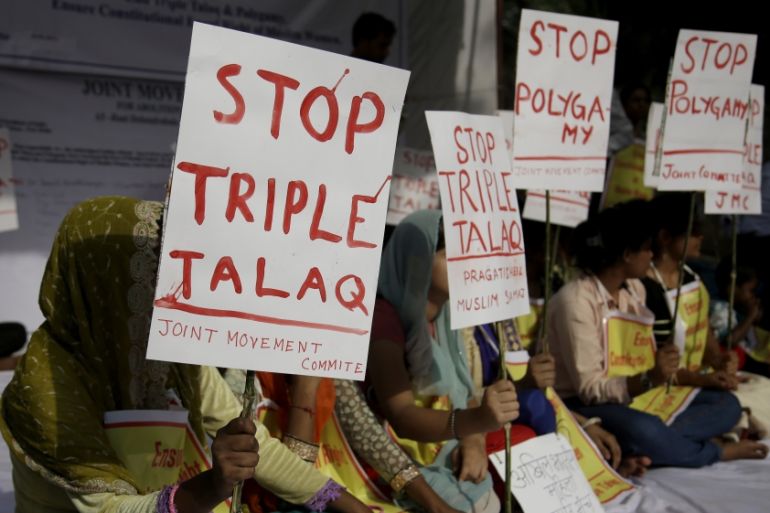India seeks to criminalise instant triple talaq divorce
Muslim men found guilty of divorcing a wife through triple talaq-style of divorce could end up in jail for three years.

New Delhi, India – India’s lower house of parliament has passed a bill that seeks to criminalise “triple talaq”, a style of instant divorce used by some in the Muslim community despite the country’s top court suspending the practice in August.
The Muslim Women (Protection of Rights of Marriage) bill 2017, introduced by the Narendra Modi government in the lower house, or Lok Sabha, on Thursday, could see men found guilty of divorcing their wives through triple talaq end up in jail for three years.
Keep reading
list of 4 itemsArmourer for the film Rust sentenced to 18 months in fatal on-set shooting
Six takeaways from first day of Trump’s New York hush money criminal trial
Azerbaijan calls for ICJ to throw out Armenian ethnic cleansing case
The bill is, in part, the result of decades of campaigning by Muslim women’s groups and victims against a practice that allows Muslim men to divorce their wives instantaneously by uttering the word “talaq” three times.
Under Islamic teaching, if the couple choose to re-marry, the wife must first wed another man and then divorce the second husband.
“In the Republic of India, if a woman is suffering owing to the cruelty and inhumanity of triple talaq, should we remain silent?” Ravi Shankar Prasad, India’s law minister and a senior member of the ruling Hindu nationalist BJP, said as he introduced the draft bill in parliament in New Delhi.
“Muslim-majority countries have regulated triple talaq in one go, why can’t we as a secular nation do it? We are not interfering in sharia [Islamic law].”
Opposition demands
The draft bill is being opposed by several political parties, and a number of opposition legislators stayed away while voting took place on Thursday.
The opposition Congress party has backed the proposed law but asked for some portions to be altered.
None of the amendments sought by the opposition were allowed by the BJP.
The draft bill will now be sent to the upper house, or the Rajya Sabha, for passage before it is forwarded to the Indian president for signing it into law.
The BJP’s brute majority ensured a smooth passage for the triple talaq bill in the lower house of parliament on Thursday.
|
|
However, the party lacks the votes in the upper house to ram through the same bill without incorporating some of the changes demanded by the opposition.
Several Muslim countries have banned triple talaq, including Turkey, Qatar, Pakistan and Saudi Arabia.
India, which is home to the world’s third-largest Muslim population, allows minorities to keep their personal laws.
Activists say the practice violates women’s rights and reinforces patriarchal hierarchies.
The Mumbai-based women’s rights group BMMA or Bharatiya Muslim Mahila Andolan (Indian Muslim Women’s Movement), was party to the legal battle and has chronicled more than 100 cases of triple talaq in India.
Founder Zakia Soman said the government’s decision was a step forward.
“We have been demanding this law for a very long time now,” she told Al Jazeera.
“We are entitled by both the Indian constitution and our religion to have a family law which is gender-just.
“In most other Indian communities, the Hindus and the Christians, women have protection of law in the matters of marriage and family. It is only the Muslim women who have been denied legal justice so far.
“We are very clear. We are fighting patriarchy. We are fighting for women’s equality. We are fighting because we believe we are equal Muslims and equal citizens.”
No alimony or compensation
In a BMMA survey last year, nearly 500 women said they had been divorced through triple talaq, with many receiving no alimony or compensation.
Shehnaz Malik, 33, was devastated after her husband used instant divorce to abandon her.
She told Al Jazeera in July: “You know, when someone’s lovingly built home collapses, there is so much pain.”
With her two daughters, she now lives in a tiny, overcrowded house with her father in Noida on the outskirts of Delhi.
![Some Muslim activists say 'triple talaq' reinforces patriarchal hierarchies [Ajit Solanki/AP]](/wp-content/uploads/2017/12/92e38468ab2c459caace843bd8b8b6a4_18.jpeg)
“I want my husband to send me monetary aid to help with my daughters’ education,” she said on Thursday.
The All India Muslim Personal Law Board, a powerful Islamic body, said the state has no right to interfere in religious matters.
“I am opposed to this bill because it violates the fundamental rights guaranteed by the Indian Constitution under article 14 and 15,” said Asaduddin Owaisi, a member of the group.
Those articles prohibit discrimination on the grounds of religion, race, caste, gender or place of birth.
“Secondly, if this bill is made into law, it will cause more injustice to Muslim women,” he told Al Jazeera, explaining that it would be difficult to prove triple talaq and unfair to place this burden on women.
Muslims comprise about 14 percent of India’s 1.3 billion people.
Election promise
Modi said earlier in 2017: “Reformers from within the community will save our Muslim mothers and sisters battling triple talaq. I appeal to the Muslim community: Don’t politicise this issue.”
The government is touting the new proposed law which criminalises the practice as a boost for India’s 90 million Muslim women.
But some fear the court ruling and the new law would aid the Modi government in its push for a uniform civil code, a poll promise.
A uniform civil code legislation would seek to end the application of religious laws to civil issues and would unify India’s personal laws that govern matters such as marriage, divorce, maintenance, adoption and inheritance.
|
|